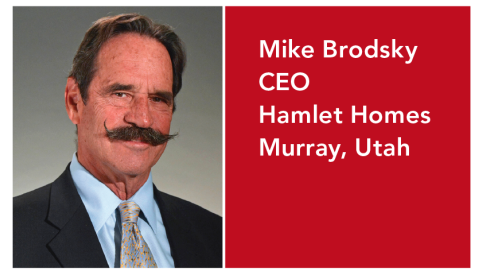| Contact Scott Sedam via e-mail at scott@TRUEN.com
|
It was a wicked late March day in the land of the windchill factor, the kind of day where winter insists on taking one final, frostbitten slap at the building community, as if to say, "I’ll be back." Temperature was 32 degrees. Spitting sleet, snow, freezing rain, then back to sleet again.
I was out at Hartford Oaks, a new luxury townhome development, looking for Chris, a young superintendent who was being primed for promotion. The big boss thought Chris might be management material, and wanted my take on him.
The field secretary directed me to units 12 to 18. I checked from unit to unit - no Chris. In the last unit, something caught my eye. Through an oversized, triple-pane sliding glass door, I saw a guy standing on the deck, roller in hand with a long extension wand, working back and forth. He was working like a banshee - but what was wrong with this picture?
He had mud on his boots, his pants, his equipment. There was, quite literally, crap all over what had been a beautiful redwood deck. Dirt, ice, snow, roof trimmings, pieces of siding, scraps of house wrap, electrical tailings - all were flying up in the air as he ran the roller back and forth.
Sitting just inside the townhome door on tarpaper (laid over brand new carpet) was the can of stain. I looked at the label and read, "Do not apply below 38" I guessed he was keeping it warm.
I watched for a moment, observing the intense, yet decidedly pained look on his face. He was clearly not having a good time. He was muttering to himself as he worked and made no effort to clean the deck or protect his work. He was slapping on the stain, pushing it over all of the construction debris and simply moving on. A complete and total mess. Incredible.
I slid open the door. He hardly looked up. "Hey," I said, "you seen Chris?"
"Hell, no!" he answered, "but if you see him, tell him he just might as well schedule this deck to be restained three months from now, ‘cause this is a joke!"
"So why are you doing it?" I asked. He didn’t miss a beat, replying, "And just who the hell are you to be asking?" Not sure what to say, I just gave him an apologetic look and said, "Well, I’m the Quality Consultant."
"Ha!" he blurted out, "you’re joking. A quality consultant! At this company? You’ve got real job security. Good luck."
Now stop right there for a moment. What are you thinking about this kid? What’s he like? Be honest. What assumptions do you have about him? I’ve spun this little scenario in many workshops, and here’s the response I get. Bad kid. Bad education. Bad parents. No respect. Doesn’t care about his work. Doesn’t care about customers. Not the kind of guy you want on you work site. Right?
Well, as you might guess, there’s more to this story. Just when I was about the grab the roller from his hands and beat him with it, the horn sounded from the roach coach that had pulled up out front.
"Come on," I said, "how about I buy you a coffee and you tell me about it?"
He eyed me suspiciously, then said, "Why not, this company owes me something." And as we walked, he told me a very interesting story.
His name was Jason and he was working for his uncle’s painting company, who had done work for this builder for 15 years. Jason was 20, a junior engineering student at the state university in town, taking a full load and still working at least 20 hours a week.
That morning, he arrived on the job at 7:00 and began some interior painting. About 7:45, Chuck, the painting crew lead man, came by and said to drop everything and start staining the decks on units 12 through 18. Jason pointed out that the decks were extremely dirty, there was no time to clean them and besides, it was about 10 degrees too cold to stain. Chuck said it didn’t matter, do it anyway.
Now we’ve got to ask ourselves, why do something so patently stupid? Turns out that morning, Chris, the superintendent, told Uncle Joe that something like 20 houses had to be done in the Division by tomorrow or else. He personally had to account for seven. (Chris really needed only five, but he wanted to cover himself.) Joe told Chris there was no money in the bid to clean the decks and that it was way too cold. Chris said just stain them anyway - as is. They’d worry about the rework in the spring.
Now, why would Chris do anything so completely dumb? That morning, Evan, the project manager, told Chris those five units had to be done or else. Evan knew well the temperature and the condition the decks were in, but he didn’t seem to care. Why? Because the evening before, the construction vp had told Evan that he needed 15 more units from him by the end of the month or else no bonuses for the quarter. (He really needed only 12, but he said 15 to cover himself.) Why? Because that afternoon at the weekly operating managers’ meeting, the division president had told the vps they had to close 12 units within three days or there’d be no quarterly bonuses. (He really only needed 10, but he said 12 to cover himself.) Why?
Because that morning, the company president, in an office far, far away, was looking at the quarterly numbers and having a fit. He needed another 100 homes closed to keep the investors happy. So he told each of 14 field operations that he needed 10 to 12 homes from each. (He had to cover himself.) He was having a board meeting in two weeks, the quarter was ending and he needed those closings. And why does the board of directors care? Because the financial markets want quarterly performance! Now we have it. It’s Wall Street’s fault!
Why does Wall Street care? Because the people who buy homes in places like Hartford Oaks want short-term results. So what we have here is homeowner/investors causing Wall Street to cause the Board to cause the President to cause the Vice President to cause the Project Manager to cause the Superintendent to cause the Contractor to cause his Painter to produce some butt-ugly decks which result in some very unhappy investor/homeowners.
We’ve come full circle. In a sense, the homeowners screwed themselves! It’s a far-out scenario, but it’s real. This scenario says a lot about how short-term focus impacts our lives, but the more important impact is on Jason, our part-time painter. This kid, who previously we surmised to be a punk, just learned a lesson about this builder’s attitude toward quality. Jason may have cared once, but it is clear now that the builder does not care. Why should Jason?
So now let’s jump forward. It’s a nice, warm June day. Jason, now on summer break, is finish-painting soffits on a nice two-story home. He turns a corner on a house and there it is: an eight-foot long section of soffit that was never primed. In the brutal Northland, finish-painting unprimed soffit guarantees that within two years, an unhappy homeowner will be asking for warranty work. But Jason also knows that he can cover it in about 6 minutes and no one will ever know (until it peals, long after he’s gone.) He’s up on a ladder, doesn’t have primer and the builder said, "Get this house done today - or else!"
What’s he going to do? What would you do? The builder has established that all he cares about is production. My bet is that Jason, being well-trained by his builder, just keeps painting.
And so the circle continues on, unbroken. And it will continue, unless someone steps in and breaks the chain. Most of you have an end of the quarter coming up here in a few weeks. Is it time for someone in your organization to step up and break the chain? Who will finally be the one to do it? You?
Also See
Scott Sedam's Editorial Archives
Advertisement
Related Stories
Hamlet Homes' Mike Brodsky on Finding Successors and Letting Go
A transition that involved a national executive search, an employee buyout, and Builder 20 group mentorship to save the deal
Time-Machine Lessons
We ask custom builders: If you could redo your first house or revisit the first years of running your business, what would you do differently?
Back Story: Green Gables Opens Up Every Aspect of its Design/Build Process to Clients
"You never want to get to the next phase and realize somebody's not happy."






